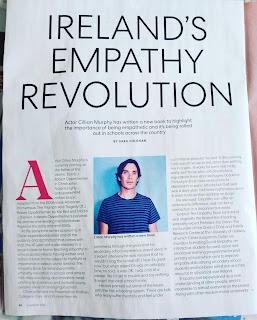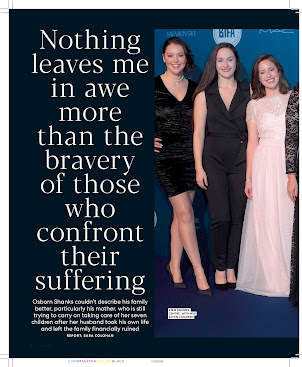Cillian Murphy: Book of Empathy feature. The Mail
Ionbhá: The Empathy Book for Ireland
From Atom Bombs to Irish classrooms, Cillian Murphy is teaching Irish children about empathy.
Actor Cillian Murphy (47), is currently starring as “the father of the atomic bomb”, Robert J Oppenheimer, in Christopher Nolan’s highly anticipated £81 million biopic. Adapted from the 2006 book American Prometheus: The Triumph And Tragedy Of J. Robert Oppenheimer, by Kai Bird and Martin J. Sherwin, it details Oppenheimer's personal life and his time leading the Manhattan Project in the early and mid-1940s.
Along with appearing in Oscar-tipped blockbusters like Oppenheimer, Cillian Murphy is also involved in a project teaching empathy in schools across Ireland. He has written and edited a book on empathy, to highlight its importance in today’s world. Ionbhá: The Empathy Book for Ireland promotes empathy education in schools and aims to help reduce bullying, discrimination, racial profiling and violence, and increase young peoples’ sense of belonging in school.
“Empathy can offer an embrace to difference, and can bring connection in a disconnected world.” Cillian Murphy
Ionbhá: The Empathy Book for Ireland was originally the brainchild of leading empathy expert Professor Pat Dolan. Dolan is the co founder of the UNESCO Child and Family Research Centre at the University of Galway, of which Cillian Murphy is a patron. Dolan co-founded Activating Social Empathy, an interactive, student-focused, social and emotional learning programme for post-primary schools which aims to improve empathy skills among secondary school students and has been rolled out as a free resource to schools all over Ireland.
Talking about the Irish schooling system Cillian Murphy said “There are kids who really suffer mentally and feel under such intense pressure. It [the Leaving Cert] was of no use to me, other than putting me in a spin . . . it works for some kids really, really well: those who can absorb facts, regurgitate them and are hugely academic. I’m lucky in that I was never prone to depression or panic attacks, but that year was a dark year. I still have nightmares about it, even more so than walking on stage.”
Empathy can be explained as a core understanding of other people, and it’s accessible to almost everyone on the planet. Along with other modern moral sentiments such as trust and altruism, empathy helps us sense and understand other people’s feelings and emotions and is seen by neuroscientists as the ‘social glue’ that keeps our society working in cooperation. Professor Dolan explains further:
“Empathy is not sympathy; it’s totally different. Empathy is the capacity to get into somebody else’s shoes and understand where they’re coming from. You can have cognitive empathy, and that’s where you understand what someone else is feeling, and that’s great, but affective empathy is where you actually feel what the person really feels.”
When we empathise, we mirror the distress of an "other," and, unless our brains are damaged in some way, we are moved to help in whatever way we can. People with a healthy level of empathy can navigate life with relative ease, feeling authentic compassion and love for others while recognising the boundary between their emotions and other people’s feelings.
There are many types of empaths, with the most common being the emotional empath, who feels the emotions of others very strongly, sometimes when they are not even close by. They can pick up on ‘vibes’ and detect energy shifts easily, but they often struggle to have a strong sense of self in relationships. The next largest group are the physical empaths, who feel the pain of others. These heightened empathy levels can leave empaths open to toxic energy and exhaustion, and some become susceptible to destructive emotion-blocking behaviours like addiction.
In the workplace, the empath can sometimes be bullied or seen as a source of authenticity and relied on by others for advice and emotional support, so balancing this can become difficult and draining. Often, empaths are targeted by empathy-deficient groups such as narcissists because some empaths can pick up on and "feel" the same admiration a narcissist has for themselves and may lack the boundaries required to clearly define their sense of "self." It’s often a hand-in-glove situation: the narcissist draws on the available energy, which often flows freely from an unguarded empath.
Shoring up emotions and managing empathy levels are crucial skills to master and can be a lifelong lesson for many empaths, but they can also help them avoid destructive relationships, both professional and personal. Clear, strong boundaries need to be developed to distinguish between someone else’s suffering and the ‘self’.
Luckily, there’s lots of support out there to make an advanced empath a superpower in the world.
Barack Obama, who recognised the power of empathy more than any other contemporary global leader, said:
“Learning to stand in somebody else's shoes, to see through their eyes, that's how peace begins, and it's up to you to make that happen. Empathy is a quality of character that can change the world.”
Professor Dolan tells us: “We’d like to think that by having Ionbhá out there makes people aware of the importance of empathy. I see it as giving someone the gift of empathy, but it’s also putting the topic out there as one we need to talk about. While we talk a lot about well-being, we don’t talk enough about empathy.”
The book is full of prose, essays, and poetry, with topics ranging from politics to entertainment, sport, and education. Contributors like Hosier, Panti Bliss, The Edge, and President Michael D. Higgins all share their stories of empathy. Royalties from the book go to the project to support pupils, teachers, and schools.
So are you a free-flowing empath? Are you often finding that you are drained and overwhelmed from giving too much of your time to others? Or, do you think you need to generate more empathy in your life? There are many tests you can do online to see how empathic you are. Answer a series of questions, and you will be able to gauge where you are on the spectrum. To get an even better understanding of your relationship with empathy, consider what type of empath you are. Experts say we need to work on it like a muscle, managing and training it to keep it in check.
The three key ways we can help balance our emotions are diet, exercise, and meditation. If you need help to shore up the flow of empathy, try speaking to a mental health expert. Also recommended is regular physical exercise; getting through a tough workout is proven to make people more empathetic to human suffering and boosts self-esteem when completed.
"If we have optimism but don’t have empathy, then it doesn’t matter how much we master the secrets of science; we’re not really solving problems; we’re just working on puzzles." Bill Gates
The Activating Social Empathy programme (ASE) has been trialled and used in 120 secondary schools nationwide, predominantly in junior cycle and in transition year. The ASE resource was recently included as a recommended resource in the Junior Cycle S.P.H.E toolkit, which will be available to every school in Ireland from September 2023 onwards. Research shows there is already positive impact from the programme. A trial found students who participated in ASE showed significantly higher emotional empathy, and significantly greater perspective-taking skills, than students who didn’t take part in the programme.
Ionbhá, The Empathy Book for Ireland, Mercier Press, €24.99.
#cillianmurphy #empathyireland
Schools interested in ASE should contact charlotte.silke@universityofgalway.ie or roisin.hanley@universityofgalway.ie


Comments